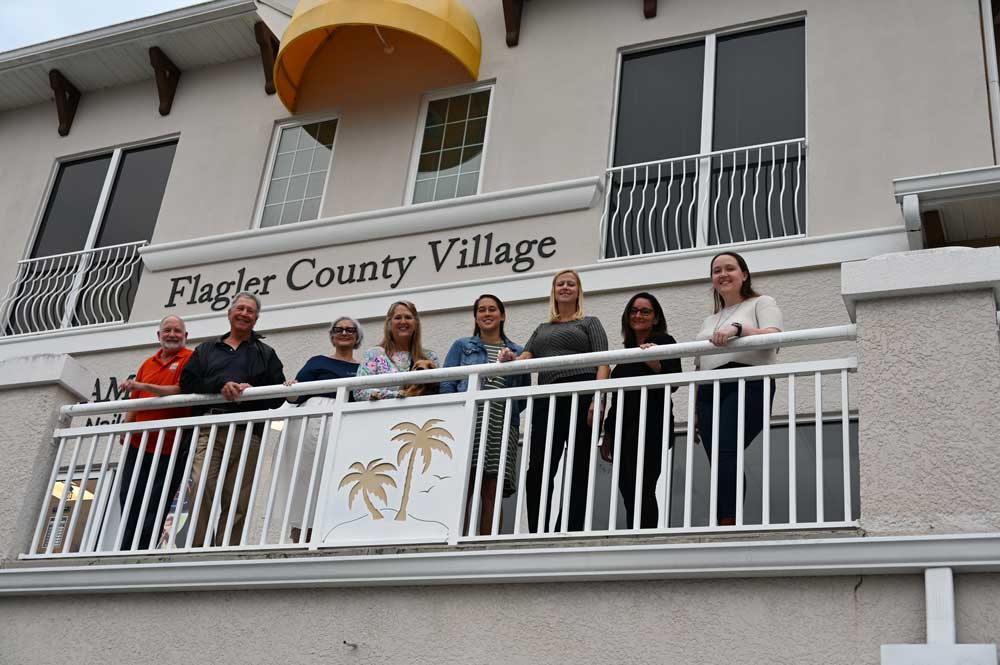
$1 million a year, every year, leading to a self-sustaining endowment worth $10 million: that’s what Dr. Stephen Bickel is pledging to award Flagler Cares, the Palm Coast-based non-profit focused on health and social services for the neediest.
It is the largest health-related private endowment in the county’s history. The first million launched the organization’s keynote ventures today.
The Flagler Catalyst Fund will underwrite projects and grants large and small that aim to break the mold of social service and health care agencies by fostering innovative models, focusing on the area’s highest needs and widest gaps in services–addiction, mental health, affordable housing–while partnering or, if necessary, competing with existing agencies.
It’s venture capitalism with a human face. It aims to remake a health care landscape that, in Bickel’s view, needs a little “disruption” to refocus on those who need help most in a county lacking in safety nets. To that end, “there is no wrong door,” in the words of Carrie Baird, CEO of Flagler Cares and the translator of Bickel’s ideas into reality.
“One of the things that’s driven me for 10 years is this thought: how are we going to sustain ourselves as a society, as a community?” says Bickel, who moved to Flagler County over a decade ago after a career in medicine and business. “We can’t have ‘discards’ in our community. I think that’s what we’ve created. So we have the outcasts, and they suffer huge amounts of pain. There’s a tremendous burden for the community from that. To me, we’re just trying to make something happen in Flagler County where everybody has, like Carrie says, no wrong door. Everybody has some place they can go and we’ll do the best we can in all the areas that we can to help them. That’s our obligation as people who’ve done okay for ourselves in our county: to make sure that everybody does okay.”
It’s a hugely ambitious plan, untried in Flagler but not without models elsewhere. Think of the $170 million Robin Hood Foundation in New York, heavily focused on education and early learning. The catalyst-fund approach is more hard-nosed than rose-colored. Bickel, whose credentials are as much MD as MBA, wants daring ideas but also accountability and results, not just idealism and certainly no administrative padding. “So it’s going to be quite a kind of a disruptive approach,” he says.
The $1 million will be split three ways. A third will be devoted to supporting Flagler Care’s infrastructure, the hub-like operating center of the enterprise with the human capital that actually makes it all happen, while keeping a lid on administrative bloat. “Nimble” is the operative word.
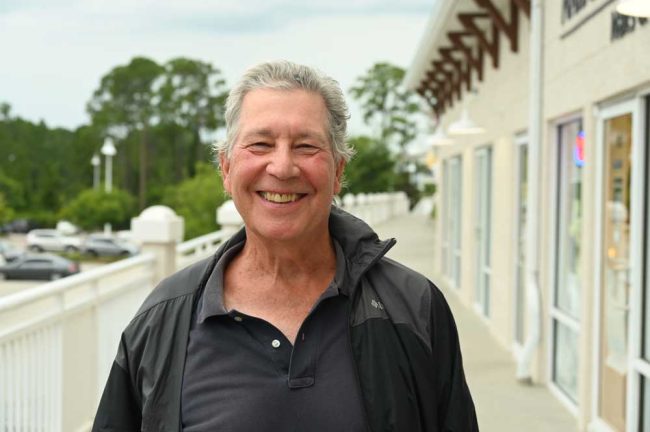
A third of the money will go to Flagler Care-initiated services, such as its contract with Impower, a Florida non-profit that will provide telehealth services, including psychiatric and psychological counseling, and a partnership with the health department to combat addiction.
The initiative with Impower also launches this week. Flagler Cares will do the care coordination, focusing on adults who either have Medicaid or those who have no income, who can’t get insurance through the healthcare marketplace and who don’t qualify for Medicaid (like single men).
And a third of the money will be devoted to catalyst grants, what may be the endowment’s crown jewel, seeding many more.
That last third will be split two ways each year. There is to be one large innovation grant of around $250,000 a year over three years, and three roughly $25,000 “capacity” grants a year.
The innovation grant speaks for itself: bring something needed but new and innovative to the county. The capacity grants will entail more direct support to help an organization grow, whether that means Flagler Cares personnel serving on the organization’s board or helping it with its books or providing other technical assistance.
Accountable Idealism
The grants are ready to go as of today. But applications won’t happen the traditional route. First an organization will have to audition for the grant. If the idea has potential, then it’s cleared for an application. “We don’t want people to do full proposals that are this thick until we’ve reviewed their initial idea and invited them to apply,” Baird says. “We’ve staged it. The first step is: tell us who you are, and what is your idea that you would like resources for and what do you think is going to be the impact of that. So instead of submitting 50 pages, you’re going to submit 500 words, because we believe in 500 words, if you really are ready for $250,000 a year for three years, you can describe what that idea is.”
“We want to be more like a business or like a venture capitalist,” Bickel says, dismissing the passive-grant approach. “We want to see a business proposal. We want to see an organization that really thinks they have a plan. We want to get to meet the people, make sure we have confidence in them. That’s more like what a venture capitalist would do. We don’t want to just give them money. We want to say, look, we’re going to be kind of involved with you,” reviewing plans periodically, mentoring if needed be.
DJ Lebo, president of the Flagler Cares board, describes it as nurturing “a germ of an organization” serving, say, 5 percent of a population in need–for whatever service that falls in line with Flagler Cares’ targeted needs–but that could be helped to serve 60 percent, if not 100 percent. The capacity grants aim to do just that.
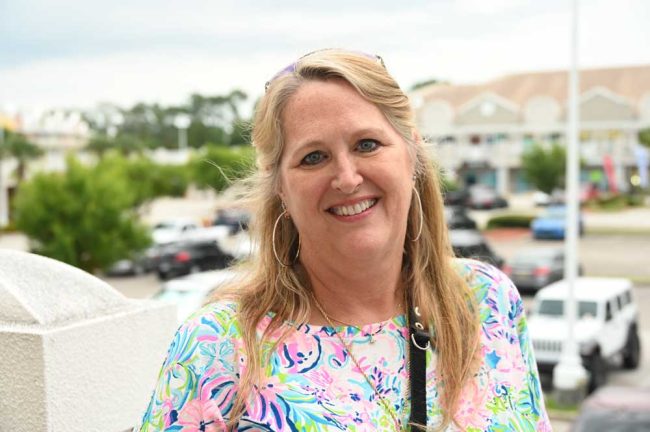
The proposal must be a needed service in Flagler, says Jeanette Simmons, the chief innovation officer at Flagler Cares: behavioral or mental health, housing, food security, child education and development. “Everything is up for consideration. But we’re targeting certain areas to be very intentional with how we move forward.”
“If an organization wanted to come to Flagler and start a transitional housing program or start an [assisted living facility] with a limited mental health license, and needed money to buy land or buy a building or renovate a building to match their existing resources, then that would be something we would consider,” Baird said. “It’s really about considering other people’s big ideas, and lending our expertise to help bring that to fruition, which includes leveraging our board, who are community leaders, leveraging our staff resources, we have clinical expertise, we have operating expertise, and trying to build capacity in other nonprofits or other organizations.”
Often grants are targeted to a specific, existing program, not to help an organization develop an innovative concept. “I like the idea that we’re breaking that mold,” Bickel says, “and we’re seeing expertise, we’re seeing great ideas, we’re seeing just huge levels of effort in smaller nonprofits that haven’t figured out how to grow using that very static model of funding programs and services. There are organizations that do great things in other areas, and we’d like them to come to Flagler to do those great things.”
The staff will review the applications, there’ll be interviews of applicants, then Flagler Cares’ finance committee, in close consultation with Bickel, will make its recommendations for the full board to approve.
Competition, Yes; Duplication, No
“I don’t think we want to fund people to do what they’re already doing,” Baird says. “Because we don’t focus on sustaining what we’re doing today. We are always thinking about tomorrow and the next thing and the next need, so I don’t think we’re interested in supplanting someone else’s existing revenue.”
Is Flagler Cares about to duplicate what other organizations are doing? Other than United Way, no other local organization is providing the sort of grants Flagler Cares is about to provide, Baird says. “When we have added a new program or a new service that we offer, it’s because no one else does it. We’re the only housing case manager in town. We are the only Health Marketplace navigator.”
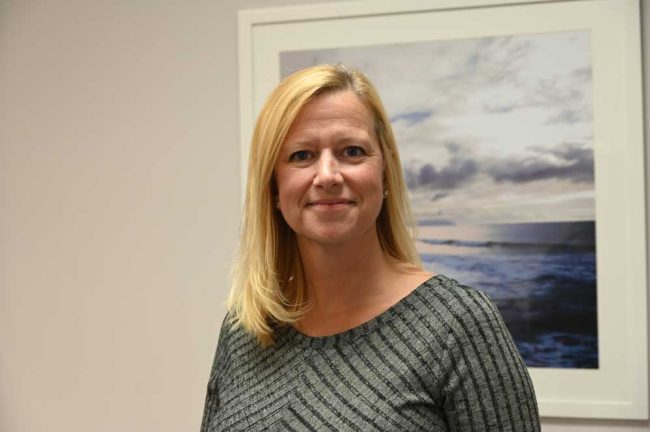
There are similarities at times. Flagler Access Center in Bunnell, which opened in January, connects addicts and people in need of mental health services with SMA Healthcare. So does Flagler Cares, but along with other services. If there’s a little competition along the way, so much for the better, in Flagler Cares’ view. “It’s almost like these organizations set up shop, and then they think they own the space and then whatever they do is fine. A little competition could be good,” Bickel says.
Competition is not the driving factor. It’s more incidental. But it’s not something Flagler Cares will attempt to avoid if it can develop potentially better initiatives than what’s already here. Imagine if innovation had stopped at flip-phones or faxes.
“I don’t think anybody thinks that monopolies are the best way to run a capitalist system,” Bickel says. It’s not to the benefit of nonprofits to “take on some of the features of monopolists. And so we think people need to have options. They need customer service orientation. We need variety. We just think it’s a healthier atmosphere. We’re not looking to supplant anybody.We’re looking for stuff where there’s opportunities or needs, and then trying to do something different or better or in a specialized way. So we think it actually contributes to a healthier ecosystem in the nonprofit sphere.”
Along the same lines, the Bickel endowment won’t monopolize Flagler Cares’ funding stream. The organization has thrived on securing grants and building partnerships over the years. It’s what drew Bickel to it. That won’t change. The Bickel endowment merely expands the reach, if vastly so, transforming Flagler Cares along the way into the literal Village it has become.
Which begs the question: what on earth is Flagler Cares? Or, for that matter Flagler County Village? The answers makes clear why the Bickel endowment is like the parabolic seed bound to find its fertile ground. “Their story is why I’m supporting them,” he says.
The Early Days of Flagler Cares
Barbara Revels, the former Flagler County county commissioner who sits on the board of AdventHealth Palm Coast, was involved in the Flagler County Free Clinic when the idea for Flagler Cares emerged in 2013 or 2014 as a bridge between existing health and social services. “Nobody knew what anybody else did. Nobody knew what the health department did,” Revels says of those days of silos.
Ken Mattison, the hospital’s CEO at the time, had come to Flagler from a community that had a hub-like committee involving everyone and anyone who had a hand in health care or social services. Flagler Cares replicated the model, with Revels and Mattison leading the first year’s meetings. “Then we stumble upon Carrie. And Carrie goes, Oh, my gosh, I can help you,” Revels says.
The organization started with just Baird as a part-time consultant. She has an unassuming way about her that masks an ability to get things done, much like Revels used to be on the county commission. A United Way grant enabled the hiring of one other person–until the pandemic, when Flagler Cares partnered with the county on Covid relief funding. It administered $400,000 in utility and rent assistance in three months. The agency showed what it could do with a pared down staff and zeal for accomplishments.
“Because we were small and wanted to be nimble, we were very focused on collaboration and coordination and policy and system change, because we thought we really could address Flagler’s needs that way, through capacity building,” Baird says. The organization has landed dozens of grants since, among them a state-funded SMA Healthcare planning grant addressing youth behavioral health and suicide.
“The county is actually the lead agency now, not SMA,” Baird says. “So it’s $1.2 million over three years that we brought to Flagler County by examining what was going on, coming up with a plan and finding money to implement the ideas.” Baird is referring to the Criminal Justice Mental Health Reinvestment grant. The county is the lead agency. Flagler Cares manages it. The funding goes to the school district, the Sheriff’s Office and Halifax Health. AdventHealth Palm Coast has also been a source of funding, as has the Flagler County Health Department.
The hospital, the health department and Flagler Cares have partnered on state and federal grants addressing health equity and disparities, says Bob Snyder, with a partnership on a substantial grant addressing overdoses ahead. Snyder heads the Flagler Health Department and sits on the Flagler Cares board.
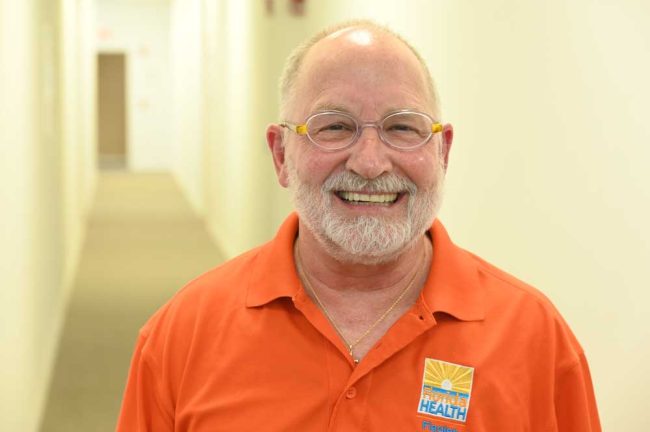
Notably, Flagler Cares also built and runs a data system that connects and cross-refers clients in need, including just-released inmates from the county jail, to 23 agencies for services–without middle men. The school district refers children who need behavioral services through the same system.
That’s how Flagler Cares itself, under the leadership of Jeanette Simmons, the chief innovation officer, is partnering with Impower, the Longwood-based nonprofit, and now building its own behavioral health service with its own clients. It’s the “make it or buy it” philosophy in action.
“What we’ve come to philosophically and strategically is,” Bickel says, “to buy stuff if we can, and only make it if we really think we can do it better or cheaper or there’s no alternative. If we can find a good telehealth provider, and then we’ll put the pieces together to make the program work in Flagler County, they already know how to do this, why should we try to reinvent the wheel?”
Snyder says over the years Flagler Cares has helped some 3,000 people get access to health care, behavioral health, or housing or supplemental security income (SSI), “so there’s a track record here of success,” he says.
Flagler County Village
Flagler Cares is no longer a fledgling operation but the county’s principal health care coordinating hub. On July 1, Flagler Cares had a $1.4 million budget, driven in large part by the Bickel grant. Last year it was $1.1 million only because of the pass-through grant for utility and rent assistance it administered. In previous years the organization’s budget was closer to $300,000.
Flagler Cares’s 15-member board is headed by Lebo, CEO of the Early Learning Coalition of Flagler and Volusia, with Bickel as vice president, Snyder as secretary and Revels as treasurer. It includes representatives from Flagler schools, Palm Coast and county government and the Sheriff’s Office. The bylaws were developed to ensure representation from key sectors. The board meets quarterly, the executive committee meets every two months. It remains a private non-profit: no sunshine law requirements apply, though the board prizes transparency.
Flagler Cares currently has 13 paid staffers, a number that could rise if the organization’s care coordinators are overwhelmed with demand for services. They work in a 5,200-square-foot space at City Marketplace–where the city of Palm Coast used to have its administrative offices before moving to City Hall in 2015. (Revels, a builder, largely rebuilt the space herself, with her husband and a friend, when other contractors weren’t available or projected too-lengthy delays. “Involved is an understatement,” Bickel says. “She basically did it.”)
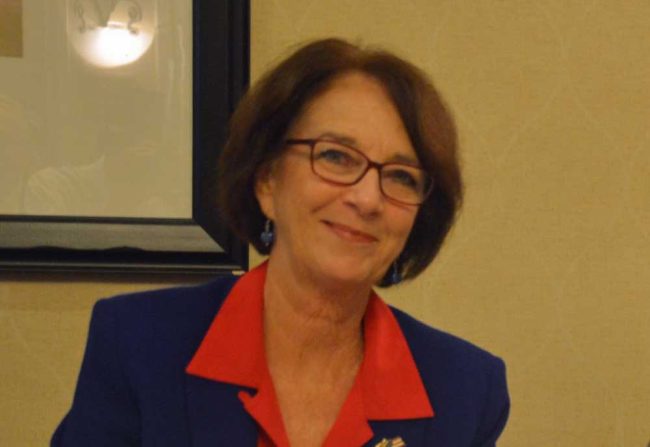
It’s called, appropriately, Flagler County Village. It’s part of Flagler Care’s vision: To create a location where local organizations and organizations that serve Flagler and Volusia but don’t necessarily have an established presence in Flagler could do so. “If they need office space to meet clients or a conference room, we wanted to remove that excuse,” Baird says, whether once a week or once a month. Flagler Cares subsidizes not all but quite a bit of the spaces, along with a $25,000 grant from the hospital.
Flagler Cares moved in in November. The Early Learning Coalition, the House Next Door, a counseling agency, Healthy Start, which works with moms and babies, all moved into the Village in January. Epic Behavioral Health soon joined. Easterseals, the program for youths with disabilities, moved in at the end of June. There’s flexible space for organizations that don’t need a full-time foothold to use when or as needed. A representative from the Department of Children and Families uses that space twice a week. The Flagler Department of Health’s Snyder is in talks with the organization to have a location there in addition to Bunnell. “It would be our very first satellite location,” Snyder says.
“We created the Flagler County Village because we wanted a place for people to come who feel most comfortable doing that, but,” Baird says, “we’ll go sit in McDonald’s, near where they’re sleeping in their car, or we will go to another public place, we’ll meet people at the library,” or deliver a tent to a homeless man whose own tent had broken.
“If they can’t come to us we go to them as well,” says Danielle Geiger, the community programs manager at Flagler Cares.
The Adventures of Steven Bickel
Baird and Bickle have been talking for seven years. “He and I should never be allowed to come up with ideas together,” she says. She’d started as his naysayer before his break-the-mold approach, that disruption he keeps talking about, won her over. Bickel’s growing involvement seemed inevitable. “I was just so impressed with how much they’ve accomplished,” he says. Less than a year ago, seeing the organization primed for its next step, he proposed the endowment.
It was for him the culmination of a lifetime’s work. The oldest of three, Bickel, 72, is the son of a Marine who went on to be the CEO of a telecom company, but not before he could have lost his life at least four times in four weeks in the battle for Okinawa alone, in 1945, when he was a forward observer, directing artillery fire in support of infantry in one of the costliest battles of World War II. It’s given Bickel a particular view on life, precarious as it can be even before it starts.
Growing up in the America of the 1950s and 60s–the America of the exuberance of Augie March (Bickel, too, is “an American, Chicago-born”), the promise of JFK, the demolition of LBJ and Nixon’s counter-reformation–there were moves across the country, to Los Angeles, to New Jersey, to Brown University for philosophy and pre-med, back to Chicago for med school (Rush Medical College) and again California for various ventures.
He couldn’t contain his interests to a single track (he still can’t), so he ended up going to business school for an MBA at UCLA, turned his medical practice into a medical group, went to public health school and became CEO of a holistic health center in San Diego with Deepak Chopra for a while (Chopra had recruited him). For all that, his deepest interest is what he calls the “totally impractical” fascination with metaphysics and the human condition. It can get intricate. It can also be as lucid as a poem he’s always loved, John Donne’s “For Whom the Bell Tolls,” still his guiding principle, from “No man is an island” to “Each man’s death diminishes me.”
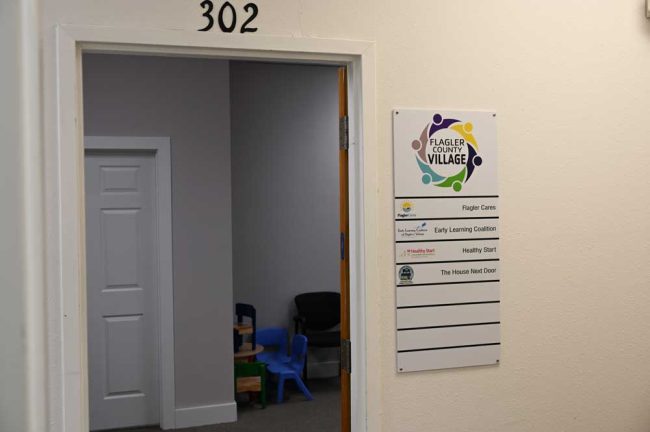
Bickel takes it literally. “To me, that really is my working philosophy is that we’re all in this together,” he says, echoing Donne’s “I am involved in mankind.” It’s not that he wants to help humanity: he is part of humanity. “I just feel connected to other people,” he says, with a purpose. A very local, cultivate-your-own-garden sort of purpose: “I’m not worrying about it on the national level. I just like to see some really good stuff happen in Flagler County, and maybe we can create our own little pocket of a somewhat better community for people.”
Dr. Stephen Playe, a childhood friend with whom he went to medical school, retired to Palm Coast in 2004. Bickel would visit. He loved the area. He moved here in 2011, ostensibly to retire. It wasn’t in him to fade away, only to repurpose. Before long AdventHealth (then known as Florida Hospital Flagler) named Humanitarian of the Year, and for the past two years he was, with Snyder, the architect of Flagler’s response to the pandemic, which kept the county ranked among the least affected by Covid, at least in Florida–not a small achievement in a state whose covid policy came to resemble Shirley Jackson’s “Lottery.”
“Steve is one of the most special individuals that we have ever met or come across in our world at the health department,” Snyder says. “We got to know him as the medical director. We got to know him as the coordinator and founder of our HIV program. He is highly regarded by the staff as an excellent partner, as an excellent medical director, and the patients love him. His patient satisfaction scores are over the top. His customer service is beyond match. And the patients just love him. So we have gotten to know him as a clinician, but also as just a special human being.”
Age takes its time, then its toll. It isn’t the fatalist in him but the business-minded planner he’s always been that led him to prepare his estate, which then led to what, in retrospect, seems like a perfect fit: the endowment. Instead of guiding artillery as a forward observer, he’s guiding innovation as a forward thinker.
That’s how Bickel came to suggest the idea to Baird in one of their brainstorms, along with Snyder–Lewis to Bickel’s Clark, or vice versa–playing a key role, as he will continue to. “We are just so enthusiastic and so hopeful for the possibilities here,” Snyder says.
Overpromising?
Revels calls the Bickel endowment “a game changer. It’s going to put Flagler Cares in a position to help so many people. And basically Steve is making it happen. So it’s a pretty fabulous, wonderful thing to have a person who’s so willing to share what they have with the rest of the community.”
Because of Flagler’s relatively smaller size, the organization is positioned to be the to be “the premier organization in the county to provide services to those that can’t get anything anywhere else,” Revels says. “Now we’ve just got to convince the rest of the community to also help fund this in various ways, where maybe we will be other people’s endowments, and those types of contributions.”
Of course there are no guarantees. A venture is by definition a risk.
“I think the risk is worth it,” Baird says, when asked about setting as high a bar. “What’s the worst that could happen? That we try something and we serve 50 people and it didn’t work. Those 50 people are better off. If we spend every dollar and we help 1,000 people and there’s no money left and we all go find other jobs, then that’s fine, too. It’s still worth that we helped those people that we helped. My commitment is to make sure that this is sustainable and that we have a variety of funding. I’m never going to stop looking for grants. But I also can say no to a grant if it doesn’t fit or it’s not worth the administrative burden.” The endowment also means it affords a measure of freedom to experiment, to fail at times, and to try again: no wrong doors.
Bickel’s father, Robert Clifford Bickel, in his unpublished autobiography, includes a chapter about surviving his month of combat on Okinawa. “Adversity,” he wrote at the end of the chapter, “seems to bring out the best in people while prosperity sometimes brings out the worst.” Sometimes, but not always. Bickel’s prosperity is positioned to do his father’s aphorism one better.
![]()
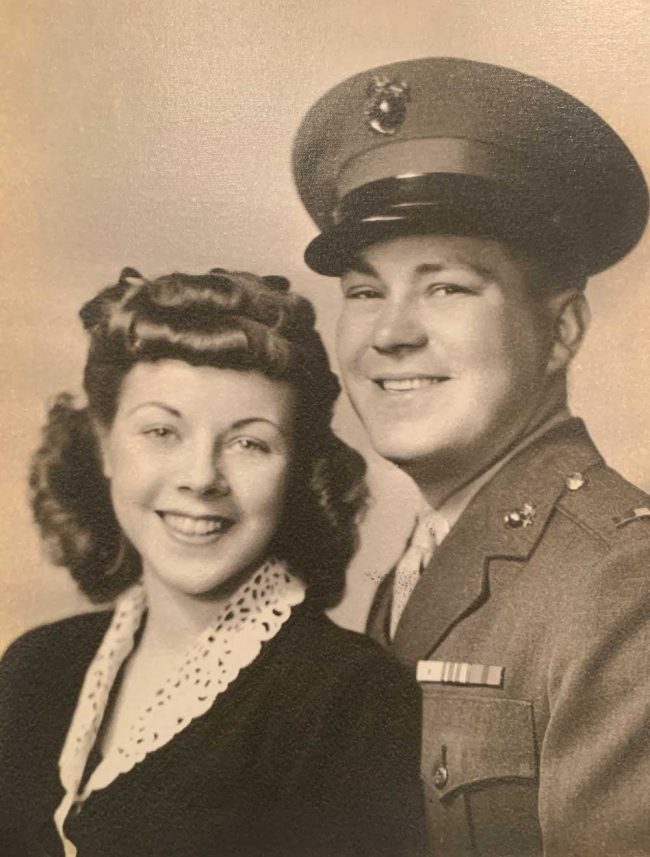





























Geezer says
I love that picture of U.S. Marine, Robert C Bickel and his wife, Jeanne Bickel.
I’d love to read RC Bickel’s biography.
“Thank you” to all the people in this article, especially Dr. Bickel—they restore my faith in people
in their acts of generosity and compassion.
Good Americans!
I know of no higher compliment.
Jane Gentile-Youd says
Wonderful people; wonderful news; wonderful work and wonderful future for so many in need. Many thanks to all of you who work so hard and who never ask for credit or thank yous. Thank you Flagler Live for sharing the ‘wonderful’ efforts of this amazing, dedicated team.
Denise Calderwood says
Thank you Dr Bickel for standing up and making a tremendous difference and shaking up the status quo. You yourself is the catalyst and we are all grateful for your significant and life changing monetary and personal dedication on behalf of the neediest residents of the Flagler community.
R. S. says
More piecemeal bureaucracy when we should go to single-payer and have everyone taken care of soundly? Just think of all the money that is going to bureaucrats, instead of helping the sick. I admire the motivation and the spirit but find the execution pretty well same ole same ole. Sorry, Doc.
DP in PC says
This isn’t piecemeal bureaucracy. It’s local action. Dr. Bickel cannot write and pass legislation that would change our healthcare system, but he did what’s going to make a profound difference locally.
Janet Sullivan says
Thank you, Steve, and all others.
tulip says
Very pleasantly impressed. Dr Bickel seems to have it” all together” and well thought out in a genuine no nonsense way. We need something like this here in Flagler County.
Wkb says
This is fine and dandy, but how does this help families get health care who can’t afford it? It seems to fund other organizations. People need info on where to go for mental health issues like Bipolar and Schizophrenia disorders. Stewart Marchmen does not have enough therapist or physicians. They are over taxed.
Terri Belletto says
Families who are uninsured or cannot afford to private pay for healthcare can register with the Flagler County Free Clinic. Our clinic was established in 2005 and provide free medical services to the uninsured, lower income families and individuals. When you are a patient of the free clinic you are assigned a primary care provider and that provider will assist in all needed medical care.
For mental health services the free clinic has been partnering with Impower Mental Health Services for the last three years, as well as Stewart Marchman Act. These services are free to patients of the free clinic.
Robert Cuff says
This is wonderful news for Flagler County and many of our underserved residents.
D.P. in P.C says
This move is 100% a local game changer. This is indeed something profound to celebrate!
Pogo says
@This is all very wonderful.
Thanks to all involved.
If anyone would like to see all of these things already in place, in every respect — and more, but on a national scale, they can read about it here:
https://blogs.va.gov/VAntage/
Chet Bell says
Steve Bickel has put his time and talent to work on behalf of Flagler’s neediest folks since the day he arrived in the county. Bob Snyder, Carrie Baird and Flagler Cares board of directors share Steve’s vision and commitment. So much good will come from their joint investment in and commitment to innovation in health and human services. Bravo!
Steve Playe says
I’ve been proud to call Steve Bickel my close friend for over 60 years since we grew up together in Homewood, Illinois. His role in Flagler Cares makes me prouder than ever. And when he talks about it he spends most of his time praising Ms. Baird and the rest of the team.
Dr. Bickel, the “Homewood Boys” sure are proud of you.
Brenda Green says
Thank you Steve, Bob, Carrie, Barb and all who are working with Flagler Cares on the behalf of those who are in need of help. So many folks fall on hard times and have no support system. This wonderful endowment plan will continue long after the 10 years—what a gift to Flagler County.
Thank you my friend, Brenda
Whathehck? says
Thank you to all involved. How refreshing to see people at work to help the neediest in our County.
No hate involved just good thoughts and good deed.
Wishing you all the greatest luck.